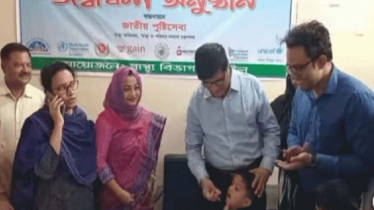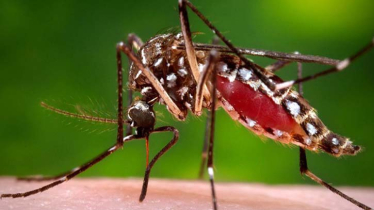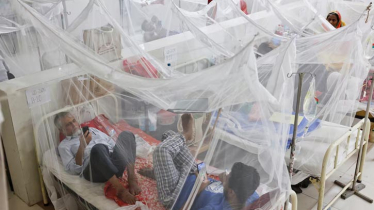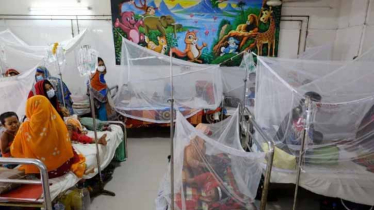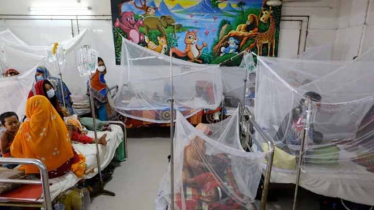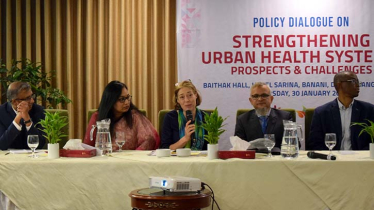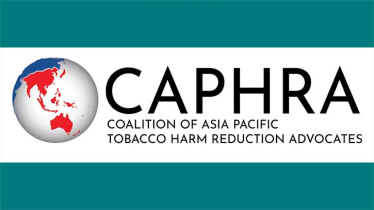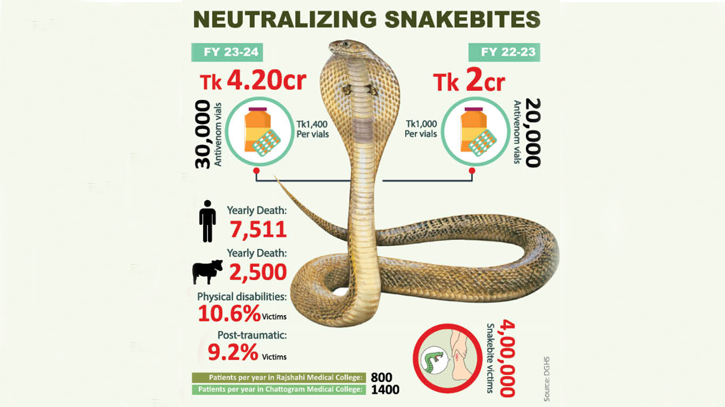
Photo : TDM
Although venomous snakes kill people including children across the country almost every day, Bangladesh still doesn’t have its own homegrown antivenom, and as such the victims often succumb to snakebites due to the dearth of antivenom, which remains heavily import-dependant.
Deaths from snakebites have marked an agonising rise in recent times – especially in this monsoon, when the acute shortage of lifesaving antivenom is costing people’s lives pretty dearly as antivenom’s supply has become few and far between.
Antivenin or antivenom is used to treat snakebite victims in the country and is imported primarily from India, which cannot fully and effectively neutralize the venom of local species of snakes.
Due to the variation in venom among and within different species of snakes, antivenin is most effective when it is produced from the venom of local snakes.
No anti-venom is produced locally yet, despite high rates of snakebites and deaths specifically from Russell’s viper, there are no news of making of antivenom this year.
Prof Anirudha Ghose, principal investigator at the Venom Research Centre Bangladesh, a government-funded initiative said, “It takes a long to make antivenom and we are working hard to make antibody specially against Russell’s viper’s bite. We have honed into making Russel Vipers antibody as soon as possible because the frequency of its bite has increased many folds in the last few years.
“Normally the process involves making anti- body at first and then making antivenom which takes at least one year to complete, he added.”
It is known that state-owned Essential Drugs Company Ltd, will produce the antivenom in Gopalganj.
The Directorate General of Health Services (DGHS) provide only 20 antivenoms in Upazila Health Complex, 50 in Sadar Hospitals and 100 antivenoms in medical colleges.
On Wednesday, Arian, a 14 months old boy of Pagla thana of Gafargaon upazilla, Mymensingh died of suspected snake bite, family said, he breathed his last on the way to Gafargaon Upazila Health Complex.
On June 16, three died of snake bite including a college student named Waz Karuni of Alfadanga Upazila of Faridpur district. He was bitten by a poisonous snake while cutting jute in the field near his house. When he fell ill, he was first taken to Alfadanga Health Complex, then to Faridpur Bangabandhu Sheikh Mujib Medical College Hospital and finally to Dhaka Medical College Hospital, where the doctors declared him dead.
The others are Varshan Mahant (11) of Parameshwarardi village of Boalmari upazila and Rahela Begum (55) of Harukandi village of Faridpur city.
On 09 August, at least 22 baby monocled cobras were found from a house and over a 100 snakes were seen in Madhukhali upazila of Faridpur on Wednesday.
Around 4.03 lakh people are bitten by snakes every year in Bangladesh, and 7,511 of them die of the injury, said a national survey of government in June.
Another recent nationwide epidemiological surveys projected 623 snakebites per 100,000 cases, and 6,041 fatalities per year. Most snakebites occur during the monsoon season are associated with work-related activities.
One-fourth of snakebite incidents in the country involve venomous snakes, according to a study titled "National Survey on Annual Incidence and Epidemiology of Snakebite in Bangladesh", conducted by DGHS released June on 2023.
Among the victims, approximately 10.6% reported experiencing mild to moderate physical disabilities, while 9.2% were diagnosed with post-traumatic stress disorder, as per the study findings.
However, concerns raised that now, the EDCL needs a will to make a farm to process making of antivenom and the DGHS suggested to make a common antivenom for treatment of 5-7 snake species bite injury for the first time as a very big firm required for 120 species of snakes antivenom.
In this FY 23-24, the DGHS will buy 30,000 vials of antivenom worth at around TK 4 crore 20 lakh as the supplier pharmaceuticals raised their cost.
The antivenom used in Bangladesh is imported from India; where six companies produce the product.
Last year, Bangladesh imported Tk 2 crore worth of antivenom to treat snakebite injury patients and just one Bangladeshi pharmaceutical company, Incepta Pharmaceuticals markets it and delivered to DGHS – at almost Tk 1,000 per vial.
"The annual demand for antivenom in Bangladesh has increased due to snake bite incident rise, in the FY 24-24, they will buy 30,000 vials of antivenom as the incident of snakebite increased this year, they already buy 10,000 at a rate of worth TK 1000 but the rest will be cost worth Tk 1400 " Dr Nusaer Chowdhury, deputy manager of the Emergency Preparedness and Response Programme of non-communicable disease control of the health directorate, told The Daily Messenger.
A patient needs 10 vials, treatment cost at TK 14,000 and total cost of the antivenom stood at TK 4 crore 20 lakh.
Experts believe that these venomous snakes may move to populated areas during the coming monsoon and because of this, the ordinary farmers of countrys’ char regions are in panic.
Furthermore, the study reveals that 95% of snakebite incidents occur in rural areas, and men are four times more susceptible to snakebites compared to women.
According to the Bangladesh National Guideline for Management of Snakebite, there are approximately 100 snake species in the country, of which 37 are venomous: 16 sea snakes, three cobras (including the king cobra, Ophiophagus hannah), five kraits, two coral snakes, six pit vipers, and one true viper: Russell’s viper.
Of them, the green pit viper and black krait are common in Chittagong, Russell’s viper is common in Rajshahi, and Sind krait in Dhaka, said Toxicology Society of Bangladesh President Dr Faiz.
Meanwhile, annually around 2,500 cows die due to snakebite in Bangladesh.
"This [death] is a huge number. We have a venom collection centre. Now we have to take measures to produce anti-venom," Health Minister Zahid Maleque said year after year.
In 2018, the government initiated the Venom Research Centre with the collaboration of various national and international institutes aim to develop antivenom domestically and develop further research facilities for snakes in Bangladesh.
“The primary one is to develop antivenom to treat bites from a wide range of venomous snakes,”.
Ecologist concerned, in the 1990s, the government put in place groundwater-based irrigation infrastructure to boost crop farming by levelling the landscape. This may have disrupted the snake especially viper's habitat and brought the snake into closer proximity to people.
TDM/SD

